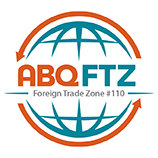FAQs
ABQ FTZ Frequently Asked Questions (FAQs)
If you don’t see your question listed here, please contact us.
What is a Foreign Trade Zone?
Put simply, Foreign Trade Zones (aka FTZs) are designated areas within the United States that are considered outside of U.S. Customs but operate under the oversight and supervision of US Customs and Border Protection (or CBP). The programs was created for exporters so that they won’t have to pay tariffs on imported raw materials if they export their final products. However, even if the final customer is in the U.S., some or all of the tariffs may still be avoidable, and at a minimum, applicable tariffs won’t have to be paid until a sale has been made which is good for a company’s cash flow. In other words, the government pretends that your imported items haven’t entered the country until after you have added value and declared the sale in the U.S. Or, if you export your final product the government pretends it never entered the country at all, enabling you to avoid paying the tariffs altogether.
What are Duty Exemption on Re-Exports?
What are Duty Deferrals?
That means that even if the final customer is in the U.S., applicable tariffs won’t have to be paid until a sale has been made which is good for a company’s cash flow. That said, when the final product is sold, it is at that moment that it’s being declared to customs.
What is a Relief from Inverted Tariffs?
For sales in the U.S., the customs classification for a final product can be different than the those of its imported inputs. This can give a company the flexibility to elect a classification with a lower tariff, or sometimes avoid paying the tariff altogether. Pharmaceutical companies, for example, have medicine as a final produce enabling them to skip paying the highly tariffed chemicals used in the manufacturing process.
What is a Zone-to-Zone Transfer?
An increasing number of firms are making use of the ability to transfer merchandise from one zone to another. Because the merchandise is transported in-bond, duty may be deferred until the product is removed from the final zone for entry into the U.S. Customs and Border Protection territory.
What does Weekly Entry Declarations Mean?
That means instead of having to declare every import shipment they receive. As each entry carries an administrative fee, the more shipments a company receives, the more savings the company incurs through a single, weekly entry. This also lessens the paperwork burden on the company.
